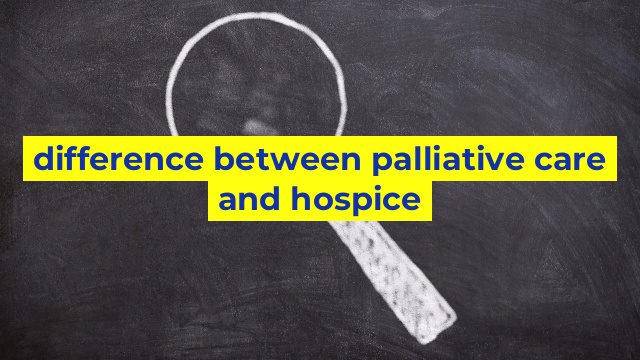The Difference Between Palliative Care and Hospice
Patients with life-limiting conditions and their families often require specialized care designed to alleviate their suffering and manage their symptoms while maintaining their dignity and quality of life. Palliative care and hospice services are two such services that offer tailored care to individuals dealing with serious diseases.
Palliative Care
Palliative care refers to specialized medical care that focuses on improving the quality of life for patients and their families facing chronic illnesses, serious illnesses, or end-of-life. Palliative care may be provided at any stage of the disease, and it helps alleviate pain, stress, and other symptoms associated with the illness. The primary goal of palliative care is to help patients and their families achieve the best possible quality of life.
The palliative care team consists of a physician, a nurse, and other healthcare professionals who work together to help relieve pain, manage symptoms, and address the emotional, social, and spiritual needs of the patient and their family. Palliative care also provides support for patients who are experiencing anxiety, depression, or other similar issues related to their illness.
Hospice Care
Hospice care refers to specialized medical care for people who have been diagnosed with a terminal illness and are nearing the end of their life. Hospice care provides palliative care and support services that aim to improve the quality of life for patients and their families in the final stages of life.
Hospice care is delivered by a team of healthcare professionals, including a physician, a nurse, a social worker, a chaplain, and other healthcare providers. The primary goal of hospice care is to alleviate pain, manage symptoms, and provide emotional support while ensuring that the patients maintain their dignity and quality of life in their final days.
The Differences
The primary difference between palliative care and hospice care is that palliative care is available to people at any stage of the disease, while hospice care is only available to those who are diagnosed with a terminal illness and are in the last stages of life. Palliative care can be provided alongside curative treatment, while hospice care is intended for people who no longer seek curative treatment for their illness.
In summary, palliative care and hospice services provide valuable support for people living with a serious or life-limiting illness. While both services offer similar types of care, the main differences lie in the stage of the disease and the goals of the care. It is important to seek professional medical help early in the disease process to identify and access available care options.
Table difference between palliative care and hospice
| Palliative Care | Hospice |
|---|---|
| Palliative care is a medical specialty that focuses on relieving symptoms and enhancing quality of life for patients with serious illnesses. | Hospice care is a type of palliative care for patients who are in the final stages of a terminal illness with a life expectancy of six months or less. |
| Palliative care can be provided at any stage of a serious illness, even if the patient is receiving curative treatment. | Hospice care is provided when curative treatment is no longer an option. |
| Palliative care can be provided in a hospital, home, or other setting. | Hospice care is often provided in the patient’s home, but can also be provided in a hospice facility or hospital. |
| Palliative care may be provided by a team of healthcare professionals, including physicians, nurses, social workers, and chaplains. | Hospice care is provided by a team of healthcare professionals, including a physician or nurse practitioner, nurse, social worker, and chaplain. |
| Palliative care is aimed at improving the patient’s overall quality of life, reducing symptoms like pain and breathlessness, and managing emotional and practical issues related to the illness. | Hospice care is centered on providing comfort care, managing symptoms, and offering emotional and spiritual support. |


